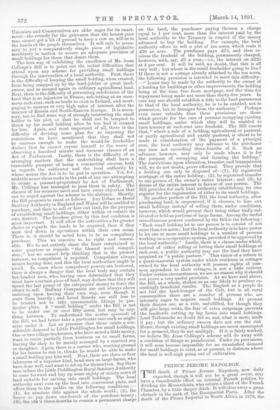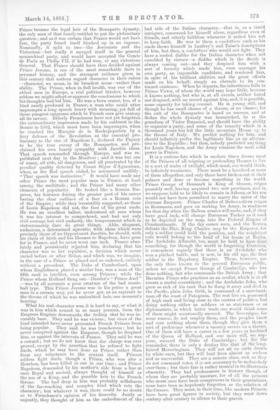PRINCE JEROME NAPOLEON. Prince became the legal heir of the
Bonaparte dynasty, the only man of that family entitled to put the plebiscitary question ; and as it was certain that France would not have him, the party found itself blocked up in an impasse. Nominally, it split in two—the Jeromists and the Victoriens—but really it merged itself in the general monarchical party, and would have accepted the Comte de Paris as Philip VII. if he had won, or any victorious General. That France should have thus decided against Prince Jerome, is one of the most remarkable facts in personal history, and the strongest evidence given in this century that nations regard character in their rulers —character, we mean, in its broadest sense—rather than ability. The Prince, when in full health, was one of the ablest men in Europe, a real political thinker, however seldom we might adopt or approve the conclusions to which his thoughts had led him. He was a born orator, too, of a kind rarely produced in France, a man who could utter impromptu a long speech heavy with meaning, yet full of those pungent epigrams which to French ears give oratory all its savour. Elderly Frenchmen have not yet forgotten the extraordinary impression made by his outburst in the Senate in 1862, which must have been impromptu, when he crushed the Marquis de la Rochejaquelein by a fiery defence of the Revolution as the essential pre- liminary to the rise of Napoleon I., declared the Papacy to be the true enemy of the Bonapartes, and ideas. his own hearty sympathy with Jacobin deas. That speech resounded through Europe, and was re- published next day in the MOniteur ; and it was but one of many, all able, all dangerous, and all penetrated by the peculiar quality detected by Count S4gur d'Aguesseau, when, as the Red speech ended, he murmured audibly : "That speech was instinctive." It would have made any other Prince the most popular man in France, at least among the multitude ; and the Prince had many other elements of popularity. He looked like a Roman Em- peror, his features during the greater part of his career having the clear outlines of a face on a Roman coin of the Empire ; while they irresistibly suggested, as those of Louis Napoleon did not, the face of his great uncle. He was an excellent talker, understood all men whom it was his interest to comprehend, and had not only civil courage but civil audacity, the temperament which in statesmanship dare do great things. Able, eloquent, audacious, a determined agnostic, with ideas which were precisely those of an Opportunist Jacobin, he should, with his claim of birth and his likeness to Napoleon, have gone far in France, and he never went one inch. France abso- lutely and persistently rejected him, declaring that his character was to her repulsive, a decision which never varied before or after Sedan, and which was, we imagine, in the case of a Prince so placed and so endowed, entirely without a precedent. The Duke of Cumberland, upon whom Englishmen placed a similar ban, was a man of the fifth rank in intellect, even among Princes ; while the Prince whom Holland flung out—Daudet's " Prince Axel " —was by all accounts a poor creature of the bad music- hall type. This Prince Jerome was in his prime a great man in a certain way, yet he never got, as an aspirant to the throne of which he was undoubted heir, one moment's hearing.
What his real character was, it is hard to say, or what it was in him which roused in so many persons, from the Empress Eug6nie downwards, the feeling that he was in- curably base. They said he was vicious ; but vices of the kind intended have never prevented French Princes from being popular. They said he was treacherous ; but he never conspired against the Emperor, though he despised him, or against the interests of France. They said he was a coward ; but we do not know that the charge was ever proved, except by the assertion that he refused to fight duels, which he may have done as Prince rather than from any reluctance to the contest itself. Princes seldom fight duels, though a Prince, who was also a Bourbon, has been killed in one in our time ; and Prince Napoleon, descended by his mother's side from a line at once Royal and ancient, always thought of himself as the son of a King, and the possible heir to the French throne. The bad drop in him was probably selfishness of the far-reaching and complex kind which rots the character ; but whatever it was, there could be no doubt as to Frenchmen's opinion of his demerits. Justly or unjustly, they thought of him as the embodiment of the bad side of the Italian character,—that is, as a timid intriguer, concerned for himself alone, regardless even of friends, and utterly faithless whenever it suited him not to keep faith. He was to them a condottiere such as his uncle shows himself in Lanfrey's and Taine's descriptions of him, but then, a condottiere who would not fight. They have a rooted dislike for the Italian character when not ennobled by virtues--a dislike which in the South is always coming out—and they despised him with a sort of ferocity which made him, even amongst his own party, an impossible candidate, and rendered him, in spite of his brilliant abilities and the great efforts made on his behalf, simply an obstacle to its con- tinued existence. When he departs, the inheritance falls to Prince Victor, of whom the world may hope little, because it knows nothing, but who is, at all events, neither hated nor despised, with no record against him, and, it is possible, some capacity for taking counsel. He is young still, and though he has small chance of a throne, or no chance, for the cult of the Bonapartes is based on success, and at Sedan the whole dynasty was besmirched, he is the grandson of Victor Emanuel, and should have the ability to organise a party, and some of the tenacity which in a thousand years has led the little mountain House up to the throne of Italy. We predict nothing for him, and should infinitely prefer the legitimate line as an alterna- tive to the Republic ; but then, nobody predicted anything for Louis Napoleon, and the Army remains the most solid power in France. It is a curious fate which in modern times dooms most of the Princes of all reigning or pretending Houses to live in a sort of realm of twilight, which must, one would think, be infinitely wearisome, There must be a hundred or more of them altogether, and only three have broken out of their palaces and done or become something in the world. Prince George of Denmark is King of Greece, reigns passably well, having acquired two new provinces, and is, we suppose, held to be likely to remain in Athens, or his son would not have been permitted to marry the sister of the German Emperor. Prince Charles of Hohenzollern reigns in Roumania, and goes on making his Army, in readiness for that day when the Balkan armies will unite, and, if they have good luck, will change European Turkey as it used to be depicted on the map, into the Federal Empire of Constantinople. If the day comes soon, and the Teutou defeats the Slav, King Charles may be the Emperor, for only a soldier could hold the position, and the weightiest vote would belong to the head of his house at. Berlin. The Archduke Albrecht, too, must be held to have done something, for though the world is forgetting Custozza, it remembers vaguely that there is an Archduke who won a pitched battle, and is now, in his old age, the first soldier in the Hapsburg Empire. These, however, are the only three known to the general European public, unless we except Prince George of Cambridge, who has done nothing, but who commands the British Army ; that Bavarian Prince who practises as an oculist, which is at all events a useful eccentricity ; and the Archduke John, who grow so sick of his rank that he flung it away and died in the Pacific, plain John Orth, in command of a merchant- man off the coast of Patagonia. The rest live on, possessed of high rank and living close to the centres of politics, but doing nothing either as soldiers or as statesmen or as diplomatists, in which latter trade one would think some of them might occasionally succeed. The Sovereigns, for some reason, do not employ them, and the peoples know and care nothing about them, though they give them a sort of preference whenever a vacancy occurs on a throne. One of them will have a career in a few years as husband of the Queen of Holland, and one more will, wo sup- pose, succeed the Duke of Cambridge ; but for the remainder, there is only a destiny like that of the long- haired Merovingians. They will not sit on carts drawn by white oxen, but they will lead lives almost as useless and as uneventful. They are a minute class, and, as they do not command votes, it is not necessary to be melancholy over them ; but their fate is rather ironical in its illustrious obscurity. They had predecessors in history though, of whom they are probably nnaware, for of all the persons i who must once have been conspicuous in their generations, none have been so hopelessly forgotten as the relatives of the Caesars. They must, in theirtime, like modern Princes, have been great figures in society, but they went down century after century in silence to their graves.



































 Previous page
Previous page